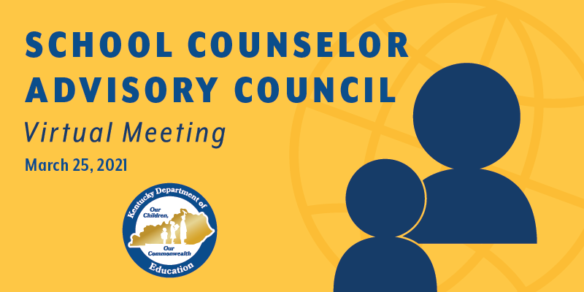
- Tucker urged schools to set up effective summer education programs and encourage participation.
- Disparities also exist in student selection for gifted programs and in punishment for transgressions, Tucker said.
By Jim Gaines
jim.gaines@education.ky.gov
All of the state’s educational authorities, from the Kentucky Department of Education (KDE) down through individual schools, are committed to closing the achievement gap between races, said Thomas Woods-Tucker, KDE’s chief equity officer and deputy commissioner in the Office of Teaching and Learning.
Doing so, though, will require efforts in several areas, including earlier childhood intervention, summer learning programs and implicit bias training for school personnel, Tucker told members of the School Counselor Advisory Council (SCAC) during their March 25 meeting. The SCAC provides Kentucky’s commissioner of education with direct input from counselors in the state’s public schools.
Data from the National Assessment of Education Progress from 2018 shows that Black students are on average two years behind White students in math proficiency, and almost two years behind in reading by the time they reach the 4th grade, Tucker said.
Studies also show that students who aren’t White or Asian are not identified nearly as often for gifted education programs, and that Black or mixed-race students are nearly twice as likely as other groups to receive out-of-school suspension for the same offenses, he said.
Counselors from several school districts commented that their schools are offering summer learning to help close the gaps.
Tucker outlined several standards for including students who need those programs, including a minimum of 20 days of instruction and efforts to encourage participation.
“Folks, incentives work. Prizes work and food works as well,” he said. A quarter of Kentucky children are food insecure, so districts need to feed students during the summer anyway, Tucker said.
Damien Sweeney, program coordinator for comprehensive school counseling in KDE’s Office of Teaching and Learning, asked council members for feedback on the creation of an “equity dashboard” of data and resources for schools statewide. The dashboard should be ready for release by fall 2021.
Sarah Akin, a school counselor in Christian County and president-elect of the Kentucky School Counselor Association, said it will be very helpful to have a centralized resource.
KDE is pulling together data from multiple sources so counselors can quickly spot gaps in programs and performance areas that need to be addressed, Sweeney said. A video is being created to help counselors find and use the information, he said.
Counselor Professional Development
Sweeney said KDE is developing an Asynchronous Comprehensive School Counseling Course/Kentucky Counselor and College Access Professional Program – tentatively dubbed KCCAPP, though its creators are seeking a new name.
The intention of the program, developed in partnership with GEAR UP and the Council on Postsecondary Education, is to ensure the state’s school counselors, GEAR UP professionals, college advisers and others are all growing professionally in the same direction, and seeing a connection between roles, Sweeney said.
He described the six proposed training modules, which include national best practices for school counselors, focus on academics and careers and diversity and inclusion.
Training for Counselors
Deborah Sauber, branch manager in KDE’s Office of Continuous Improvement and Support, gave an outline of multiple training opportunities for counselors and other school personnel offered by her office. Topics include social-emotional learning, mindfulness, the Sources of Strength program, trauma-informed practices and several others. Training is available to school districts and regional educational cooperatives, she said.




Leave A Comment